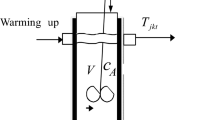Abstract
This chapter presents a digital control system for ITU TRIGA Mark-II reactor using genetic algorithms with simulated annealing. The basic principles of genetic algorithms for problem solving are inspired by the mechanism of natural selection. Natural selection is a biological process in which stronger individuals are likely be winners in a competing environment. Genetic algorithms use a direct analogy of natural evolution. Genetic algorithms are global search techniques for optimisation but they are poor at hill-climbing. Simulated annealing has the ability of probabilistic hill-climbing. Thus, the two techniques are combined here to get a fine-tuned algorithm that yields a faster convergence and a more accurate search by introducing a new mutation operator like simulated annealing or an adaptive cooling schedule. In control system design, there are currently no systematic approaches to choose the controller parameters to obtain the desired performance. The controller parameters are usually determined by test and error with simulation and experimental analysis. Genetic algorithm is used automatically and efficiently searching for a set of controller parameters for better performance.
Access this chapter
Tax calculation will be finalised at checkout
Purchases are for personal use only
Preview
Unable to display preview. Download preview PDF.
Similar content being viewed by others
References
Instrumentation System Operation and Maintenance Manuel, (1976) General Atomic Co.
K.J. Astrom, (1983) Theory and Application of Adaptive Control - A Survey, Automatica, Vol. 19, No. 5, p. 471.
P.S. Tuffs, D.W. Clarke, (1985) Self -Tuning Control of Offset: A Unified Approach, IEE Proc.-D, Vol.132, No: 3, p. 100.
K. Erkan and B. CAN, (1996) Self Tuning Control of ITU TRIGA Mark-II Reactor, First Trabzon International Energy and Environment Symposium, Karadeniz Technical University, Turkey, p 285.
D.E. Goldberg, (1989) Genetic Algorithms in Search, Optimisation and Machine Learning, Addision Wesley.
J.H. Holland, (1992) Adaptation in Natural and Artificial Systems: An Introductory Analysis with Applications to Biology, control and Artificial Intelligence, Cambridge: The MIT Press.
K.F. Man, K.S. Tang, S. Kwong, (1996) Genetic Algorithms: Concepts and Applications, IEEE Trans. On Industrial Electronics, Vol. 43, No. 5, p. 519.
M.A. El-Sharkawi, S. Weerasooriya, (1990) Development and Implementation of Self-Tuning Tracking Controller for DC Motors, IEEE Trans. on Energy Conversation, Vol. 5, No. 1, p. 122.
L. Ljung, (1987) System Identification - Theory for the User, Prentice-Hall, Englewood Cliffs, N.J.
J.A. Bernard, D.D. Lanning, A. Ray, (1985) Use of Reactivity Constraints for the Automatic Control of Reactor Power, IEEE Trans. On Nuclear Science, Vol. 32, No. 1, p. 1036.
J.A. Bernard, D.D. Lanning, (1985) Issues in the Closed-Loop Digital control of Reactor Power, IEEE Trans. On Nuclear Science, Vol. 33, No. 1, p. 992.
K. Erkan and M. Inal, (1996) Neural-Net Controller for ITU TRIGA Mark-II Reactor, First Trabzon International Energy and Environment Symposium, Karadeniz Technical University, Turkey, p 279.
B. Can, (1992) Optimal Control of ITU TRIGA Mark-II Reactor, 12 European TRIGA Users Conference, NRI Bucaresti-Pitesti, Romania.
K. Krinstinsson and G.A. Dumont, (1992), System Identification and Control using Genetic Algorithms, IEEE Trans. Syst. Man. And Cyber., p. 1033.
I.K. Jeong and J.J. Lee, (1996) Adaptive Simulated Annealing Genetic Algorithm for System Identification, Eng.Appl.Artif.Intell., Vol. 9, No. 5, p. 523.
S.S. Ge, T.H. Lee, G. Zhu, (1996) Genetic Algorithm Tuning of LypunovBased Controllers: An Application to a single-Link Flexible Robot System, IEEE Trans. On Industrial Electronics, Vol. 43, No. 5, p. 567.
H. Yavuz, B. Can, E. Akbay, (1990) The Investigation of Nonlinear Dynamics Behaviour of ITU TRIGA Mark-II Reactor, 11 European Triga Users Conf., Hiedelberg, Germany, pp 2. 39–2. 53.
Author information
Authors and Affiliations
Editor information
Editors and Affiliations
Rights and permissions
Copyright information
© 2000 Springer-Verlag Berlin Heidelberg
About this chapter
Cite this chapter
Erkan, K., Bütün, E. (2000). Reactor Controller Design Using Genetic Algorithms with Simulated Annealing. In: Ruan, D. (eds) Fuzzy Systems and Soft Computing in Nuclear Engineering. Studies in Fuzziness and Soft Computing, vol 38. Physica, Heidelberg. https://doi.org/10.1007/978-3-7908-1866-6_16
Download citation
DOI: https://doi.org/10.1007/978-3-7908-1866-6_16
Publisher Name: Physica, Heidelberg
Print ISBN: 978-3-7908-2466-7
Online ISBN: 978-3-7908-1866-6
eBook Packages: Springer Book Archive




